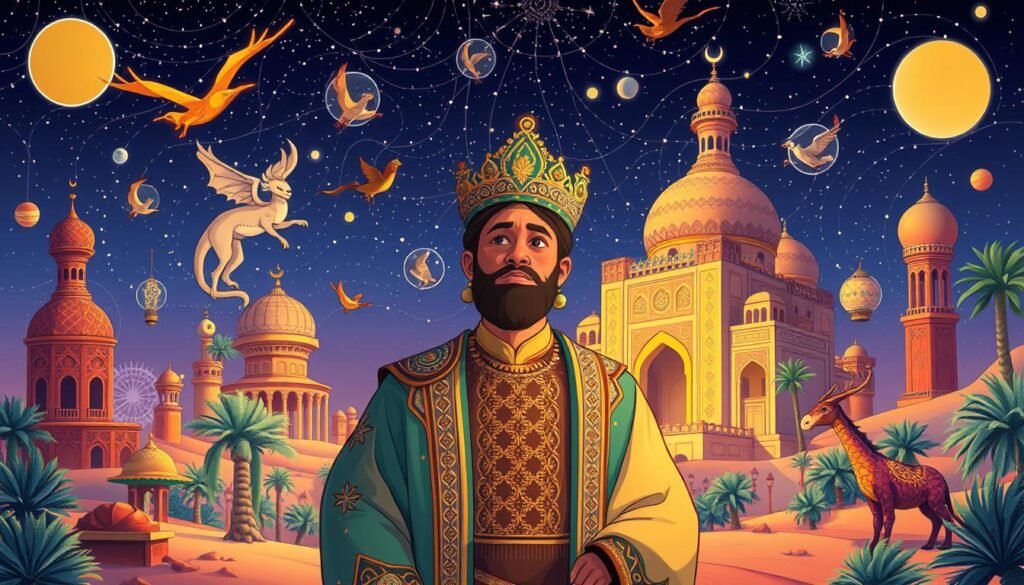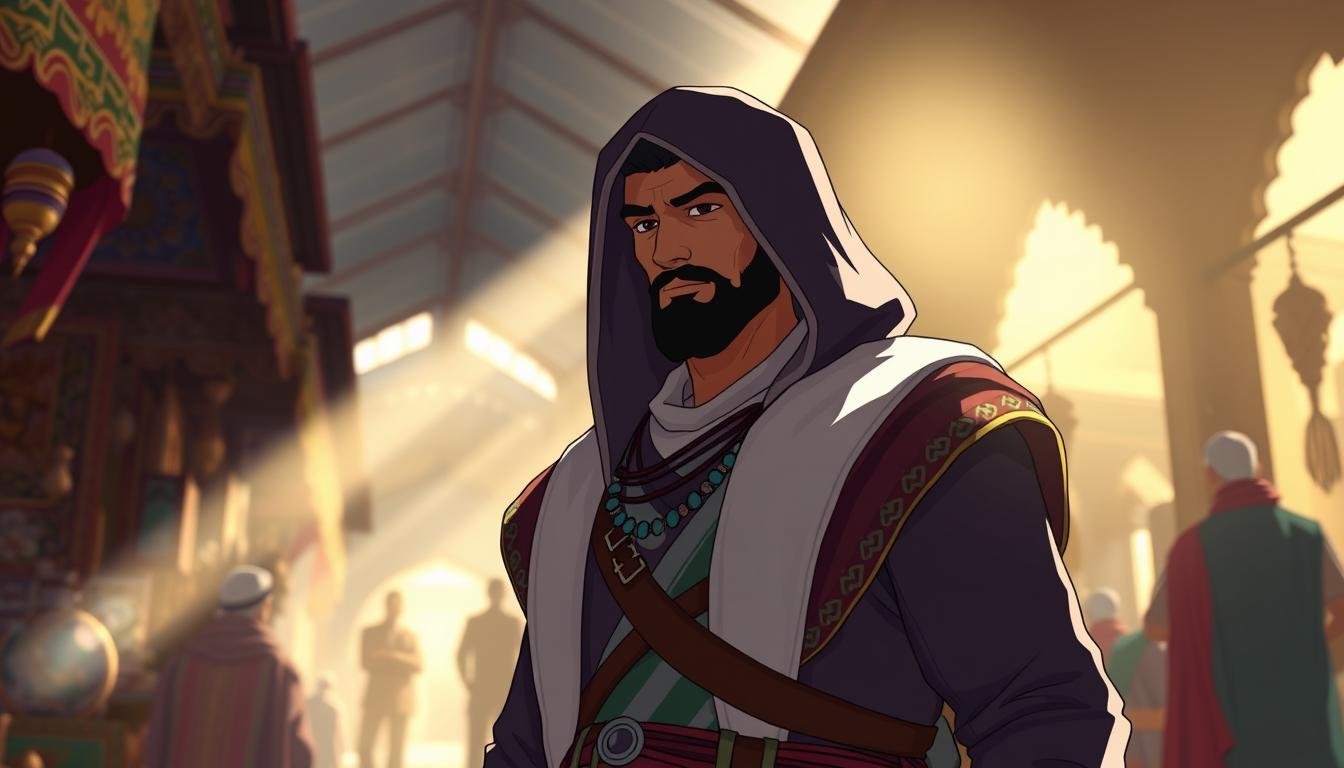Have you ever thought about how a character in a game can show us complex religious ideas? In Assassin’s Creed Mirage, Basim Ibn Ishaq is a key figure. He was born around 844 in Samarra. His story is both historical and deeply personal, making us wonder about his beliefs.
Basim’s actions and choices in the game make us think about his faith. His story is set in Islamic culture but also touches on myths and personal battles. This mix shows us a rich and complex view of his faith.
Introduction to Basim Ibn Ishaq
Basim Ibn Ishaq was born around 844 in Samarra. He is a key figure in the Assassin’s Creed series. His story mixes real history from 9th-century Baghdad with the series’ myth.
In “Assassin’s Creed Valhalla,” Basim is a Master Assassin. His story is full of identity, loyalty, and justice.
“Assassin’s Creed Mirage” is coming in 2023. It will show Basim’s early years. He goes from a street thief to a skilled assassin in Baghdad.
His story is filled with cultural and religious themes. This makes him one of the most interesting characters in the series.
Basim’s story is complex. He is a Sage of Loki, adding depth to the Assassin’s Creed lore. His journey is shaped by alliances and encounters, like meeting a Djinn.
This journey hints at his powerful legacy and the challenges he faces. It shows his identity is complex.
We’re excited to see more of Basim in “Assassin’s Creed Mirage.” His story touches on faith and personal struggle. It connects with today’s themes of cultural identity.
For a look at faith and its effects, read about Tristan Tate’s views on religion here.
Historical Context of Basim in the 9th Century
Basim’s life was set against the backdrop of 9th century Baghdad. This was a time of great cultural and intellectual growth. Baghdad was a center for scholars, merchants, and dreamers.
The city was alive with learning and trade. Yet, the social and political scene was full of challenges. These challenges shaped the lives and futures of its people.
Impact of the Abbasid Caliphate
The Abbasid Caliphate was key to Baghdad’s growth. It created a place where innovation and trade thrived. Baghdad was the world’s largest city then, a mix of cultures and beliefs.
This diversity was crucial. The Abbasids wanted to bring different groups together. They welcomed people from all walks of life, including non-Arab Muslims and those of other faiths.
The Caliphate valued knowledge. They set up the House of Wisdom. It became a place of learning, attracting scholars from everywhere.
Life in Baghdad During Basim’s Era
Life in 9th century Baghdad was not always easy. There was instability and class differences. The Anarchy at Samarra from 861 to 870 was a particularly hard time.
The city was rich because of its trade routes. But, wealth didn’t solve all problems. Issues like classism, extortion, and slavery were common.
Basim’s story shows the ups and downs of life during the Abbasid reign. His journey from an orphan to an assassin highlights the struggles of the time.
Basim’s Cultural Background
Basim’s story is filled with Arabic mythology and Islamic culture. These cultures deeply shape his life and who he is.
Influences from Arabic Mythology
Arabic mythology is key in Basim’s tale. It sets the stage for his growth, touching on fate, power, and the supernatural. This mythology adds depth to Basim’s journey, showing his moral battles.
It shows how the author connects history and myth. This makes Basim’s story even more interesting.
Understanding Djinn in Islamic Culture
Djinn are important in Arabic mythology and Islamic culture. They are beings that live apart from humans and gods. They can be good or bad.
In Basim’s story, Djinn represent his inner fights. They add richness to Assassin’s Creed Mirage. This makes the game interesting for many people.

Is Basim Muslim?
In Assassin’s Creed, Basim shows us Islamic identity and faith in a new way. He’s connected to Islamic lore but doesn’t follow it strictly. His story makes us think about how religion is shown in movies and games.
Basim’s actions show his Basim beliefs are complex. He’s seen as a symbol of the fight between personal beliefs and society. The game shows his Islamic identity in many ways, making us think about cultural representation.
Basim’s story is important because it challenges old views of Islam. He shows us how a character can deal with faith, right and wrong, and legacy. This makes us see the world’s cultures in a new light.
Relationship with the Hidden Ones
Basim’s journey into the Hidden Ones is a big change for him. He wants to find redemption and belong in this group. Joining the Brotherhood gives him a new purpose and changes how he sees justice and loyalty.
Joining the Brotherhood
Basim chose to join the Hidden Ones, a group known for its secrets. This choice was strategic, aiming to fight the Order of the Ancients. He became a Master Assassin in Constantinople and worked to weaken his enemies in England.
Impact on His Identity and Beliefs
The Brotherhood’s teachings changed Basim’s view of himself. His experiences made him see justice in a new light. Basim’s journey shows a complex character dealing with the moral sides of being an assassin.
As he grows, Basim is tied to the Hidden Ones’ legacy. He also grapples with his past, including his ties to Loki and the Isu.
Basim’s Quest for Justice
In “Assassin’s Creed: Mirage”, Basim starts a big journey. He wants justice. His sense of duty and past conflicts make him question his morals.
His quest for justice often turns into seeking revenge. This mixes his personal goals with wanting to hold society accountable. His actions’ morality is a big question, showing his choices might not always be right.
The Morality of His Actions
Basim’s actions spark debates about right and wrong. His past shapes his views, making us think about what’s truly just. He faces tough choices, making us wonder about justice and revenge.
Every decision he makes makes us think. It makes us question what justice really means in a world full of corruption.
Vision of Injustice Inspired by His Past
Basim’s view of justice comes from his childhood. Seeing his father fight against powerful foes shaped him. These experiences made him strong but also showed him the world’s injustices.
His story shows the big picture of society’s wrongs. It makes players face these issues. His actions are more than revenge; they’re about fixing a broken system. The cultural background of Basim’s story adds depth, making us think about history’s struggles in his quest for justice.

Religion and Spirituality in Assassin’s Creed Mirage
Assassin’s Creed Mirage explores Basim’s character deeply. It shows how Islamic beliefs shape his story. The game uses stories to mix religion with bigger themes like identity.
Players see Islamic culture in the game’s setting. Basim’s story shows his spiritual journey as a Muslim. It makes players think about faith and its role in life.
Playing Assassin’s Creed Mirage makes players think about their beliefs. Basim’s story asks big questions about faith and right choices. This makes the game more meaningful and connects players to the story.
The Significance of Djinn in Basim’s Journey
Basim in Assassin’s Creed Mirage lives in a world filled with Djinn. These magical beings add depth to the story. They also shape Basim’s growth on his adventure. Djinn show the game’s themes of morality and power in 9th-century Baghdad.
Djinn as Spatial and Moral Entities
Djinn are both guides and obstacles for Basim. They make him face his inner battles. Their presence leads to key moments of self-discovery for Basim.
Djinn play many roles. They can offer wisdom or show Basim’s darker side. This complexity deepens the Assassin’s Creed story. It especially highlights Basim’s connection to Loki’s legacy.
Basim’s Legacy in Assassin’s Creed Franchise
Basim is more than just a character in Assassin’s Creed Mirage. He marks a big change in the series. He shows the mix of culture, history, and faith in a unique way. Players learn about morality and faith through Basim’s story.
This makes us think about how media shows these themes. Basim’s story is a key part of his legacy.
In Mirage, Basim grows as an assassin. He meets Roshan and Rayhan, showing the Hidden Ones’ inner struggles. Roshan’s views add depth to Basim’s story. This shows how different people can see things differently, even in the same cause.
Looking at Basim’s legacy, we see it’s not just about heroes. It’s about the challenges faced by diverse characters in their beliefs.
Connections to Cultural and Religious Themes
Basim’s journey touches on religious themes in a big way. Set in Baghdad during the Abbasid era, it shows how society and beliefs shape culture. The game’s detailed Baghdad adds to the story’s depth.
This focus on culture and the use of Arabic dubbing make the game more real. It shows the value of diversity in gaming. Basim’s story teaches us about the power of storytelling in exploring identity and ethics.
FAQ
Is Basim a Muslim character in Assassin’s Creed Mirage?
What historical period does Basim belong to?
How does Arabic mythology influence Basim’s character?
What role do Djinn play in Basim’s narrative?
How does Basim’s journey relate to themes of justice?
What is the significance of Basim’s relationship with the Hidden Ones?
How does Assassin’s Creed Mirage address the topic of religion and spirituality?
What is Basim’s legacy within the Assassin’s Creed franchise?

Embracing Faith, One Insight at a Time!
The teachings of the Quran have always guided my path. With a deep passion for Islamic knowledge, I strive to blend the wisdom of tradition with the relevance of today, making the timeless messages of Islam accessible and meaningful for everyone.
Muslim Culture Hub is my platform to share historical insights and thought-provoking articles, exploring both well-known and lesser-discussed aspects of Islamic culture and beliefs. My mission is to create an inclusive online space where everyone can learn, strengthen their faith, and connect with the profound message of Islam.
Join the journey!
May peace be upon you.








